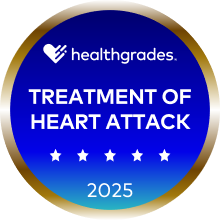Heart Bypass Surgery
Coronary artery disease (CAD) is a build-up of plaque inside the coronary arteries that supply blood to the heart muscle. CAD restricts blood flow to the heart muscle and causes chest pain, shortness of breath and fatigue. CAD also increases the risk of a heart attack.
Patients with coronary artery disease are often candidates for an operation called coronary artery bypass grafting (CABG), also known as heart bypass surgery, to improve blood flow to the heart. Our cardiac surgeons are leaders in this complex field of surgery with outcomes that surpass national averages.
In a CABG procedure, the surgeon will take healthy blood vessels (artery or vein) from another part of the body, such as the leg, arm or chest, to re-route blood around the existing blockage. This is called a graft. If a patient has multiple coronary arteries that are blocked, the surgeon will perform multiple grafts. The surgeon will connect the healthy blood vessels above and below the blocked coronary artery to create a new pathway for oxygen-rich blood to flow to the heart muscle. Our UM St. Joseph cardiac surgeons are leaders across the nation in using the radial artery conduit in bypass surgery, which has been found to improve long-term outcomes.

